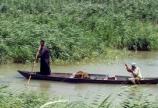Reseeding a way of life in Iraq’s marshlands
- Tara Sharpe

A great swath of marshland once carpeted the south of Iraq for thousands of miles. Beginning in 1989, most of this exceptional ecosystem was drained under Saddam Hussein’s regime. Now, while news headlines spell out stories related to other regions of Iraq, two researchers at the University of Victoria and an expert at the Fraser Basin Council are helping to frame a new way of life for the people of the southern Iraqi marshes.
In 1988, an estimated 500,000 people lived in the region of land cradled between the Euphrates and Tigris rivers just north of where the two waterways drain into the Persian Gulf. Their traditional way of life was based on subsistence living. They fished for consumption and commerce (60 per cent of fish on Iraq’s market once came from the marshes), raised water buffalo for milk, and used the tall thick reeds of the marshes for constructing homes and making carpets, baskets and other household items.
By 2003, the population had dwindled to less than 100,000 people, residents had dispersed to Iraqi cities or scattered to other regions, and the marsh surface area had diminished to less than 15 per cent of its original size.
The international community and Iraqi representatives have placed great emphasis on the restoration of this eco-reserve as part of the overall reconstruction of Iraq. Canada is involved through the Canada-Iraq Marshlands Initiative.
The initiative is split into two components with $5 million in funding from the Canadian International Development Agency (CIDA). One component, led in Canada by the University of Waterloo, focuses on ecological aspects of restoration; the other, led in Canada by UVic, concentrates on social and economic recovery. Representatives from various Iraqi institutions are closely involved in both components of the marshlands initiative.
UVic—in partnership with the Fraser Basin Council (an advocacy group for sustainment of the Fraser River and its 13 watersheds)—is playing a consultative role, working with Iraqi officials to develop long-term plans for reinvigorating the social and economic patterns of life in the marshlands. UVic geography professor Dr. Stephen Lonergan, Maureen Maloney, QC, director of UVic’s Institute of Dispute Resolution, and David Marshall of the Fraser Basin Council were selected by CIDA to coordinate this work.
Workshops have been created for retraining in traditional crafts such as reed-working. Fifteen crafts workshops—five from each of the three governorates—will be under way early this year.
“The marshland dwellers’ economy was primarily based on subsistence, but certainly it was a sustainable one,” says Lonergan. “In fact, we can see in these marshes how economics and sustainability can be intrinsically linked. But how will the people of the marshes want to set up their way of living after they have experienced certain modern amenities elsewhere, such as electricity and health services?” While some may want to keep old traditions, others may want the new amenities too. These are the questions that need to be answered in the rebuilding of a way of life.
Maloney acknowledges that one of the project’s “enormous challenges is providing leadership at a distance. We can’t go into Iraq, so it can be difficult to measure what the residents might want either individually or collectively.” Scattered communities of homes built of bundled reeds on artificial islands present a unique problem for attempting any type of census, so it’s up to the leaders of the three marshland governorates (Iraq is currently sectioned into 26 governorates), the area’s largest tribes and the three universities serving the area to reflect the voices of the people.
Restoring water is another challenge. The Tigris and Euphrates rivers both originate in Turkey, and their flow has been modulated and weakened over the past 20 years due to major dam projects. Much of the marshland water now needs desalinating before it can be consumed. And there is oil under some of the land, raising questions about which sections should be reflooded and which should be left dry.
With war a frequent reason for headlines, the slow reseeding of a once fertile stretch of land can at least be a good reason for hope.
Photos
In this story
Keywords: Iraq, recovery, Fraser Basin Council, economics
People: Stephen Lonergan, Maureen Maloney, David Marshall

